Wife Criticizes Husband for Being a ‘Doormat,’ Shocked When He Leaves Over Her Remarks
The 42-year-old dad left his wife of the same age after 24 years of marriage. The reason? Comments over the years about being not “manly enough”, but then it became an abundance in one year that made him feel small and that he didn’t matter.
Even with a host of stereotypically “manly” strengths—height, physique, DIY and auto repair–savvy, and an amateur boxing background—his wife was not pleased with parts of her husband’s personality she considered to be insufficiently masculine. The things she loved became the evidence against her — baking cookies, a taste for pop music, a small car, and an aversion to three decades of wars half a world away.
He feels liberated and happier, but still wondering whether or not her words were true, and if he is fated to go through life alone. Now that she is providing therapy and reconciliation, he has to decide if he should start over and pick up where they left off, or embrace this new journey of cavalier exploration.
Repeatedly attacking your partner is a sure way to get them to leave

Which is what one man did when he tired of his wife calling him unmanly

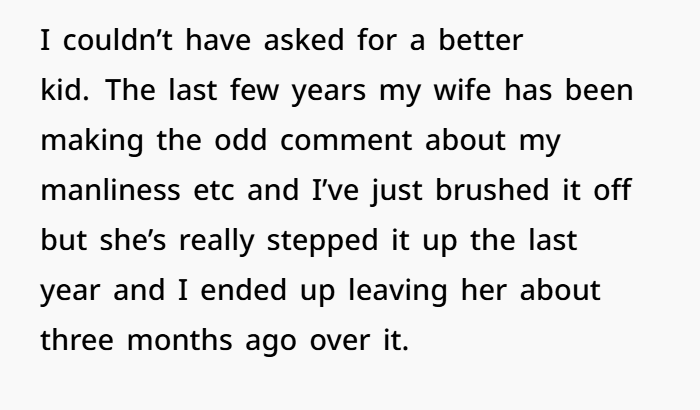




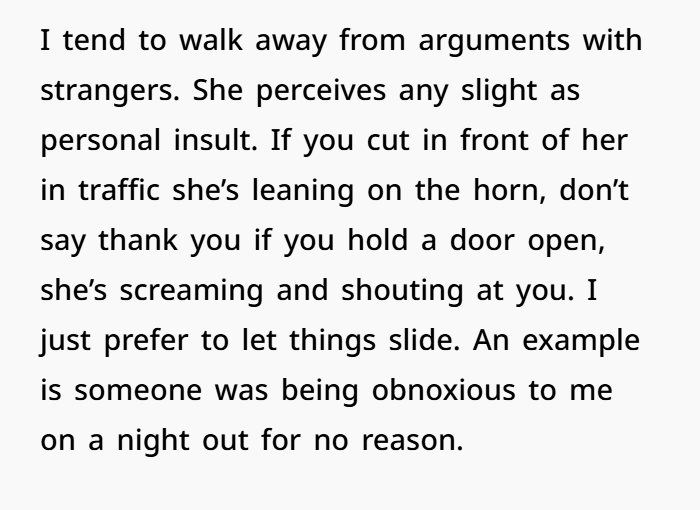


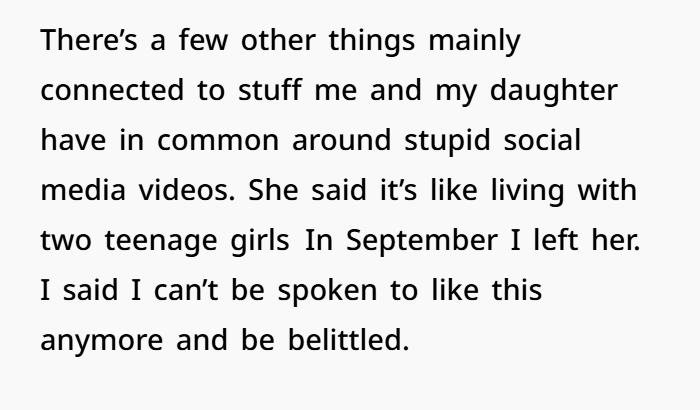
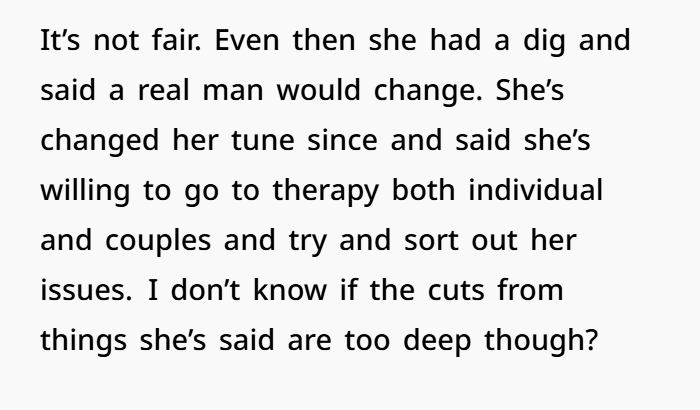
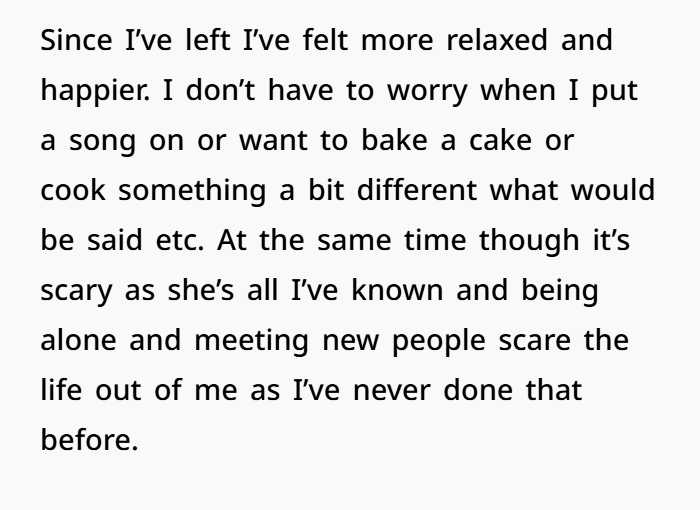
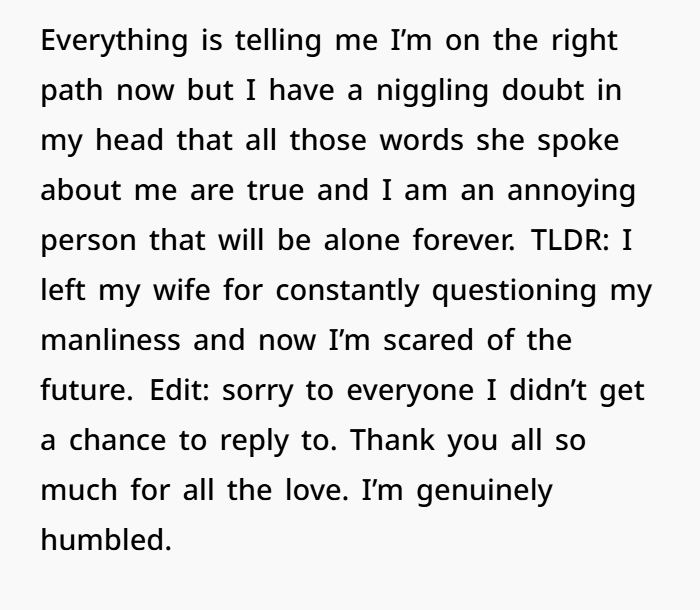

Emotional Abuse, Gender Norms, and Moving Forward
1. The Harmful Effects of Emotional Criticism
Emotional verbal abuse, especially coming from a partner will erode self-esteem and leave deep emotional scars. The wife used traditional notions of gender to undermine her husband’s confidence by challenging his masculinity at every step of the intervening process. Eventually, that becomes emotionally abusive because it fosters a non-stop environment of criticism, and will impede the survivor from feeling valued.
Psychologists from The American Psychological Association (APA) state that it can over time psychologically injure a partner, and it is a cruel and harmful way to control about anything, be it their personality, interests, or how they do things; Clearly, this may destroy a partner’s mental health and the pillar of the relationship as well.
2. Redefining Masculinity in Modern Relationships
With temperate skills such as cooking, baking, and a how-to guide on defusing conflict nonviolently, the husband represents a more balanced, healthy form of masculinity. The fact that his wife cannot abide this change indicates a disparity in their values and worldviews, and creates a point of inherent friction in the relationship.
Toxic relationships are some of the most morally dangerous traps that fucking spiral out of control, but it does not always have to be ways to walk and walk.
3. The Impact of Walking Away from Toxic Relationships
This is just not easy thing to do, especially because you moved to a long-term relationship that comprises your whole adult-length of a profiled life. But, by leaving the relationship, the husband has chosen to put his emotional health first and reclaimed his freedom to enjoy the things he likes and be who he is without any shame.
He says he feels “relaxed and happy” since leaving, suggesting the relationship had been a major source of stress. According to Relate. According to the UK relationship support charity, Relate, being in a toxic environment can sometimes mean that a person forgets who they really are — when they free themselves, they can more easily reconnect with their healthier self and seek new (and healthier) relationships going forward.
4. Should He Consider Reconciliation?
We have to bear in mind, too, that his wife has now offered therapy and a desire to change.
- Accountability: Has she truly recognized the harm caused by her words, or is her offer to reconcile rooted in fear of being alone? True change requires acknowledgment of past behavior.
- Genuine Effort: Therapy can help, but only if both parties are equally committed to growth and healing. If she continues to dismiss or minimize her actions, reconciliation may not be sustainable.
- His Happiness: The fact that he feels freer and happier since leaving suggests that returning to the marriage might stifle his newfound peace.
Ultimately, therapy could be beneficial regardless of whether reconciliation is pursued, as it may help him process lingering self-doubt and build confidence for the future.
5. Moving Forward: Embracing Independence
The fear of being alone after decades in a relationship is natural, but it’s also an opportunity to rediscover one’s identity and explore new possibilities. The husband’s self-awareness and willingness to confront his emotions suggest he’s well-equipped to build a fulfilling life, whether single or with someone new.
Practicing self-compassion and surrounding himself with supportive people—like his daughter, who clearly adores him—will help him overcome feelings of inadequacy and embrace the next chapter of his life.
Many readers were supportive





It can never be easy to walk away from a decades long marriage due to the ongoing emotional abuse, but in this instance it was the correct choice. His wife repeatedly tried to break his male spirit and belittle him.
Though she made him an offer to go to therapy, I believe her offer also indicates that she might not be ready to change, and by the same token, her ex seems fairly at peace and happy, and could benefit from moving on his own path to healing. He can live a life of living unapologetically and embracing his interests and values without the fear of being judged.

